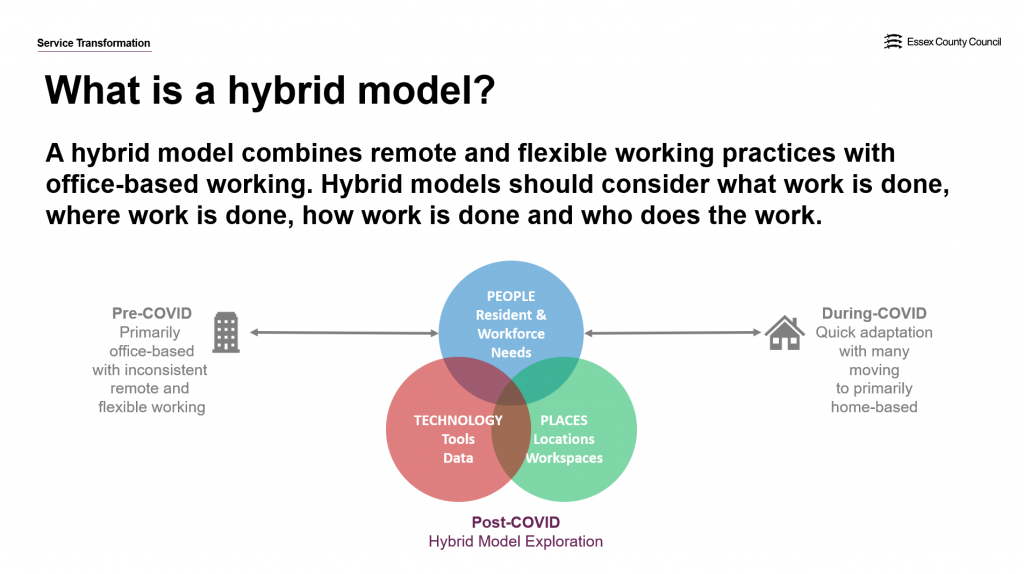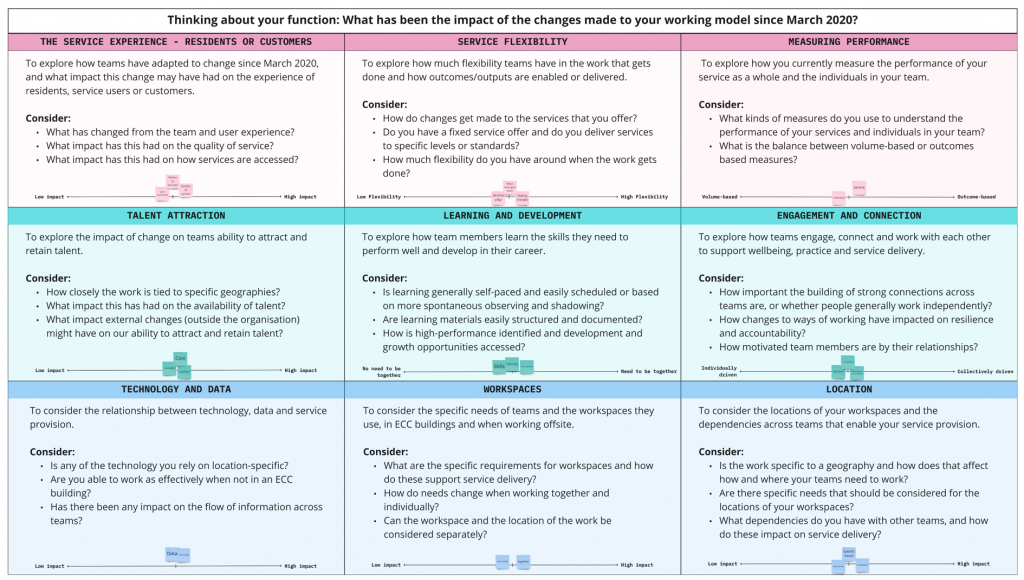Since March 2020 teams across Essex County Council have been working in radically different ways. Many are still working from home every day, whilst others have changed their rotas and working patterns to meet new demands created by the COVID pandemic response.
We’ve created a new framework to help teams explore some of the main aspects of hybrid working. It will help them to understand and articulate what’s important as our short-term working models evolve into our longer-term, and maybe even permanent ways of working.
If hybrid working is the answer, what are the key questions?
Our senior leaders urged us to look for opportunity in the unprecedented levels of change and adaptation seen in the last year. And our staff research has shown that many people, but not all are also seeing benefits from these changes. We know that an organisation staffed by talented, motivated and healthy staff will deliver the best value for our local residents and businesses. So how can we help teams to champion what’s working well and find ways to improve the things that aren’t so good?
One of the main insights from our digital remote working research was that remote working was a positive development for the majority of staff - as long as it’s by choice and not every day.
In response it has been proposed that a hybrid working model, blending time spent working remotely with time spent working collaboratively in public sector spaces, might be the answer for many teams.

The speed of change has meant that there aren’t really any standards or guidance to help teams make sense of the current situation.
As a large and diverse organisation, we need to think about the needs of all teams; from social workers to corporate accountants, community team managers to contact centre and library staff. Even designers!
Lots of people working in lots of different ways to meet the needs of people in Essex.
We started to think about how we could help teams across the organisation to explore the impact of changes to their ways of working.
- How might we help them to explore the wider aspects of hybrid working, rather than just the ones that were in their eyeline?
- How can we support consistent conversations across the organisation so that we can quicky understand the common enablers and challenges around effective hybrid working?
- How can we reduce the risk of making decisions now, based on our pandemic response, that are not aligned to the evolving future needs of the organisation and the people we serve?
A framework for exploration
Working closely with colleagues from our organisation development and change teams, we reviewed the research and started speaking to teams around the organisation to understand what their main areas of focus were.
We initially identified nine main focus areas, grouped these into three main areas of exploration:
- Service experience: What impact have changes to our ways of working had on the services offered to local residents and business? What flexibility exists around how services are offered, and how has this changed? How is service performance measured and how do we understand the impact of ongoing change?
- Team experience: What is the impact on our ability to attract and retain the right talent and skills? What impact has there been on the learning and development activities we undertake in our teams? What impact have we seen in the connectivity between team members, wider colleagues and partners in other organisations that we collaborate with? How has this effected the engagement and motivation of our workforce?
- Hybrid enablers: What are the main technology, data, workspace and location considerations for effective hybrid working? What lessons have we learned from the rapid move to 100% remote working, and how do we build on what’s working well?

Against each of these focus areas we created a selection of prompts to keep teams focused in the right way to help them fully explore changes to their ways of working.
Importantly, the framework should also help teams that can’t naturally work in hybrid ways to articulate what’s important to them as well. For hybrid working to be successful we need to understand the practicalities and challenges that all teams face. If a hybrid model isn’t right, we want to understand why – and how this could impact on the working models of other teams. This should be a rich, contextual conversation that helps the service to understand and articulate changes to their working model, not just a check-box exercise.
Engaging teams whilst supporting good decision-making
We are now supporting hybrid working exploration conversations with teams across the organisation. We’re also creating a set of guidance for managers to introduce them to the approach, and a set of facilitation guides to help our colleagues lead the right conversations and capture the right insights.
The teams we have worked with so far have all welcomed the opportunity to explore hybrid working. We’re hearing that leaders are finding it useful for engaging their teams in conversations around the future. The framework is helping to bring focus to the things they were already thinking about and is highlighting areas where they may need to do some more work.
By the end of March 2021 we will have engaged over 1,000 employees in the exploration process. We’re optimistic that we’ll then have a dataset, organised around our nine focus areas, that can really start to influence decision-making around the things that will make hybrid working a success.
Sharing as we learn
There’s still a long way to go for ECC as teams continue to support local response and recovery activities. We still have more questions than answers around our future ways of working, but we also now have an evidence-based approach that will help us to find some of the answers.
We know we’re not alone in this work and that all organisations are wrangling with similar challenges. So, our plan is to release the framework and guidance under a creative commons license in the very near future.
If you are interested in learning more please sign up for updates.
Leave a comment